What Is a Casino?

Casinos are venues where people can play a variety of games. These include roulette, baccarat, poker and blackjack. Some casinos also offer other gambling games such as bingo and lotteries. They also sometimes offer a number of free lessons in certain games, including slots and video poker.
The word “casino” comes from the Italian word for little house, and was originally used to refer to a small clubhouse where people could gather for social occasions. It spread across Europe and eventually became the term for large public gaming rooms.
Most people associate the casino with Las Vegas and other popular tourist destinations, but there are many other types of casinos around the world. These range from modest places with one or two tables to large megacasinos that have hotels, restaurants and even non-gambling game rooms.
Almost all casinos feature a wide variety of games, and each game has a built in statistical advantage for the casino. This is called the house edge and it ensures that the casino will make money over time from patrons’ bets on the games.
Players are able to play casino games from their homes or on the go, and they can choose whether they want to play offline or online. Often, the latter option offers more convenient features such as live chat and customer support.
In addition to offering a wide variety of games, casinos are also popular because they provide excellent security and safety measures. Several different security personnel work in each casino, and they are trained to watch for cheating or other suspicious behaviors.
Most casinos have an elitist atmosphere, with high rollers and high-stakes gamblers among the most frequent visitors. They can afford to pay higher entrance fees and spend more on food and drinks, and they usually receive perks, like free shows or tickets to a concert or sporting event.
These perks may be in the form of gift cards or other incentives that are designed to encourage gambling and reward customers. They also help attract new gamblers and keep them coming back for more.
Some casinos, such as those in Las Vegas and other tourist destinations, may even offer free travel packages or cheap buffets to draw customers to their establishments. This strategy can generate a substantial amount of revenue for the casino and is beneficial to both the casino and the local economy in the long run.
Gambling is a huge business and the casino industry has grown to become an important part of the tourism industry. This is because casinos boost the economic well-being of nearby businesses and provide a major source of tax income.
The main reason why most people play at casinos is to have fun and try their luck at winning some money. However, it is important to remember that if you don’t have the skill or money to win big money, you should not waste your time or energy.
Regardless of how much money you have, it is important to understand the rules of any casino game before you start playing. Most casinos will give you a free lesson on the game before you start playing, and it is a good idea to take advantage of these lessons to learn the rules of the game and practice your skills.